仁爱版英语七年级下册Unit7Topic2导学案教案
- 格式:doc
- 大小:58.00 KB
- 文档页数:2
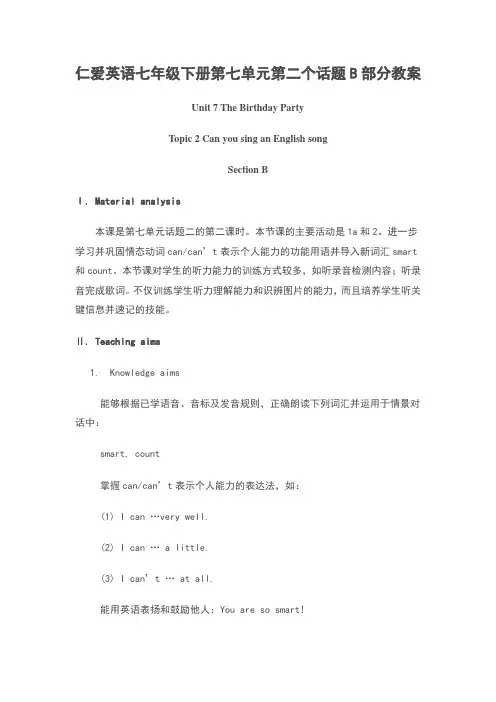
仁爱英语七年级下册第七单元第二个话题B部分教案Unit 7 The Birthday PartyTopic 2 Can you sing an English songSection BⅠ. Material analysis本课是第七单元话题二的第二课时。
本节课的主要活动是1a和2。
进一步学习并巩固情态动词can/can’t表示个人能力的功能用语并导入新词汇smart 和count。
本节课对学生的听力能力的训练方式较多,如听录音检测内容;听录音完成歌词。
不仅训练学生听力理解能力和识辨图片的能力,而且培养学生听关键信息并速记的技能。
Ⅱ. Teaching aims1. Knowledge aims能够根据已学语音、音标及发音规则,正确朗读下列词汇并运用于情景对话中:smart, count掌握can/can’t表示个人能力的表达法,如:(1) I can …very well.(2) I can … a little.(3) I can’t … at all.能用英语表扬和鼓励他人:You are so smart!能用英语表达自我意愿: I would like to take these flowers to the party.2. Skill aims能够听懂有关现在能做和不能做的事情的对话和简单的故事;能够听懂简单的课堂用语并作出适当反应;能够和同伴就能做和不能做的事情进行口头交流;能够用正确的语音、语调朗读对话;能够参照图片或范例写出简单的句子。
3. Emotional aims通过学习英文歌曲,体会到学习英语的乐趣;通过小组间良性竞争与合作,培养学生之间友好互助的精神。
Ⅲ. The key points and difficult points1. Key points能够应用情态动词can引导的Or Questions,如:—Can Ann dance or draw—She can dance.能够用can/can’t表示能的有关程度,如:She can do it a little/very well.能够熟练使用表达自我意愿的表达方式。
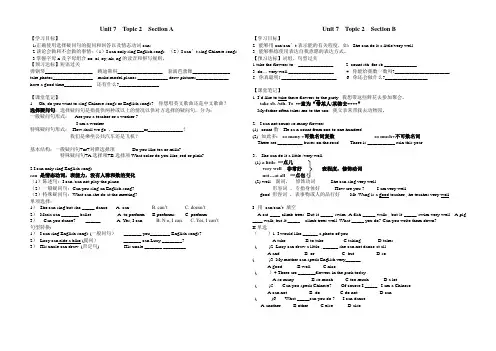
【学习目标】1:正确使用选择疑问句的提问和回答以及情态动词can:2.谈论会做和不会做的事情:(1)I can only sing English songs. (2)I can’t sing Chinese songs.3.掌握字母n及字母组合oo, oi, oy, nk, ng的读音和拼写规则。
【预习达标】短语过关弹钢琴___________________ 跳迪斯科__________________ 表演芭蕾舞_______________ take photos________________ make model planes ____________ draw pictures_____________ have a good time___________ 还有什么?________________【课堂笔记】1. Oh, do you want to sing Chinese songs or English songs? 你想唱英文歌曲还是中文歌曲?选择疑问句:选择疑问句是指提供两种或以上的情况以供对方选择的疑问句,分为:一般疑问句形式:---Are you a teacher or a worker ?--- I am a worker.特殊疑问句形式:How shall we go ,____________or______________?我们是乘坐公共汽车还是飞机?基本结构:一般疑问句+or+对照选择项Do you like tea or milk?特殊疑问句+A选择项+B选择项What color do you like, red or pink?2.I can only sing English songs.can 是情态动词,表能力,没有人称和数的变化(1)陈述句:I can /can not play the piano.(2)一般疑问句:Can you sing an English song?(3)特殊疑问句:What can she do at the meeting?单项选择:1). She can sing but she _____ dance. A. can B. can’t C. doesn’t2). Maria can _______ ballet. A. to perform B performs C. perform3).---Can you dance? ---______. A. Yes, I can. B. N o, I can. C. Yes, I can’t句型转换:1). I can sing English songs.(一般问句)_______ you________ English songs?2). Lucy can ride a bike.(提问)_______ can Lucy ________?3). His uncle can draw .(否定句) His uncle _______ _________. 【学习目标】2. 能够用can/can’t表示能的有关程度,如:She can do it a little/very well.3. 能够熟练使用表达自我意愿的表达方式。
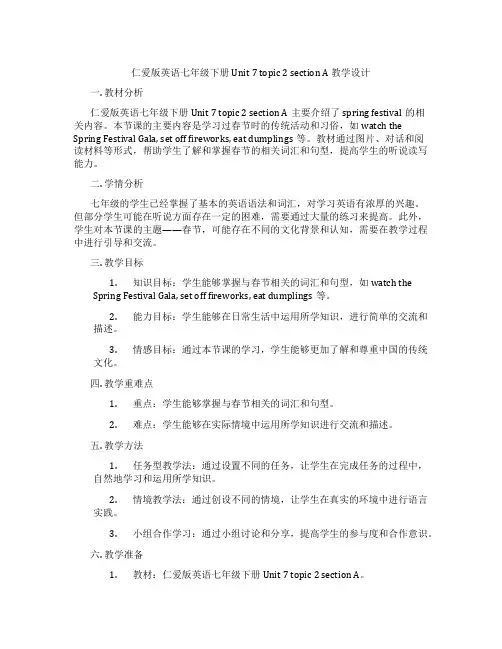
仁爱版英语七年级下册Unit 7 topic 2 section A 教学设计一. 教材分析仁爱版英语七年级下册Unit 7 topic 2 section A主要介绍了spring festival的相关内容。
本节课的主要内容是学习过春节时的传统活动和习俗,如watch the Spring Festival Gala, set off fireworks, eat dumplings等。
教材通过图片、对话和阅读材料等形式,帮助学生了解和掌握春节的相关词汇和句型,提高学生的听说读写能力。
二. 学情分析七年级的学生已经掌握了基本的英语语法和词汇,对学习英语有浓厚的兴趣。
但部分学生可能在听说方面存在一定的困难,需要通过大量的练习来提高。
此外,学生对本节课的主题——春节,可能存在不同的文化背景和认知,需要在教学过程中进行引导和交流。
三. 教学目标1.知识目标:学生能够掌握与春节相关的词汇和句型,如watch theSpring Festival Gala, set off fireworks, eat dumplings等。
2.能力目标:学生能够在日常生活中运用所学知识,进行简单的交流和描述。
3.情感目标:通过本节课的学习,学生能够更加了解和尊重中国的传统文化。
四. 教学重难点1.重点:学生能够掌握与春节相关的词汇和句型。
2.难点:学生能够在实际情境中运用所学知识进行交流和描述。
五. 教学方法1.任务型教学法:通过设置不同的任务,让学生在完成任务的过程中,自然地学习和运用所学知识。
2.情境教学法:通过创设不同的情境,让学生在真实的环境中进行语言实践。
3.小组合作学习:通过小组讨论和分享,提高学生的参与度和合作意识。
六. 教学准备1.教材:仁爱版英语七年级下册Unit 7 topic 2 section A。
2.多媒体教学设备:用于展示图片、播放视频等。
3.教学卡片:用于操练和巩固所学知识。
七. 教学过程1.导入(5分钟)通过向学生提问:“What’s your favorite festival?”引导学生谈论节日,进而引入本节课的主题——春节。
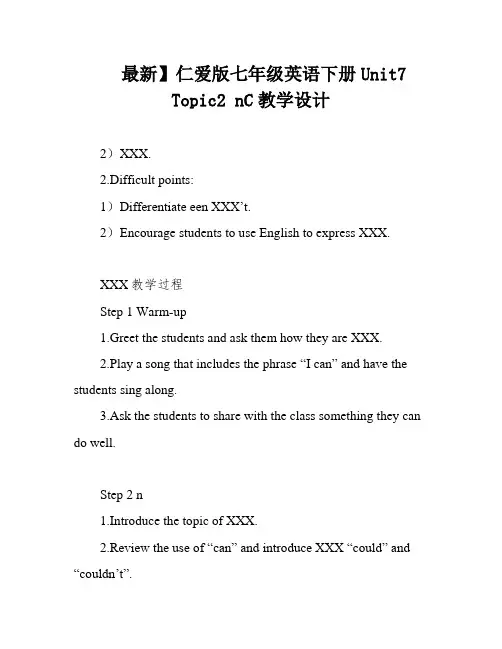
最新】仁爱版七年级英语下册Unit7Topic2 nC教学设计2)XXX.2.Difficult points:1)Differentiate een XXX’t.2)Encourage students to use English to express XXX.XXX教学过程Step 1 Warm-up1.Greet the students and ask them how they are XXX.2.Play a song that includes the phrase “I can” and have the students sing along.3.Ask the students to share with the class something they can do well.Step 2 n1.Introduce the topic of XXX.2.Review the use of “can” and introduce XXX “could” and “couldn’t”.3.Provide examples of sentences usi ng “could” and “couldn’t” and ask the students to XXX.Step 3 Practice1.Have the students work in pairs and ask each other about their XXX “could” and “couldn’t”.2.Encourage the students to use both positive and negative XXX.3.Monitor the students’ XXX.Step 4 n1.Ask the students to share with the class something they could do in the past but cannot do now.2.Encourage the students to use the past tense form of “could” and “couldn’t”.3.Provide XXX grammar.Step 5 n1.Review the use of “could” and “couldn’t” and the differences een the two.2.Ask the students to XXX.3.Provide feedback and correct any errors.Step 6 Homework1.Ask the students to write a short paragraph about something they could do in the past but cannot do now.2.Encourage the st udents to use the past tense form of “could” and “couldn’t”.3.XXX XXX.XXX教学反思XXX een the use of “could” and “couldn’t” and were XXX。
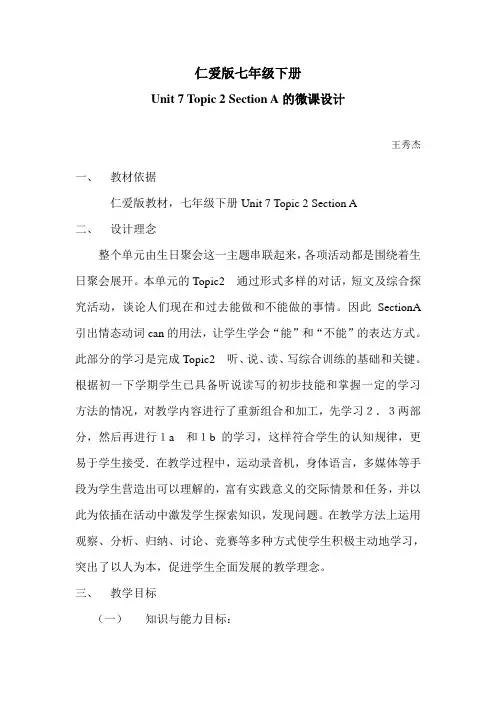
仁爱版七年级下册Unit 7 Topic 2 Section A的微课设计王秀杰一、教材依据仁爱版教材,七年级下册Unit 7 Topic 2 Section A二、设计理念整个单元由生日聚会这一主题串联起来,各项活动都是围绕着生日聚会展开。
本单元的Topic2通过形式多样的对话,短文及综合探究活动,谈论人们现在和过去能做和不能做的事情。
因此SectionA 引出情态动词can的用法,让学生学会“能”和“不能”的表达方式。
此部分的学习是完成Topic2听、说、读、写综合训练的基础和关键。
根据初一下学期学生已具备听说读写的初步技能和掌握一定的学习方法的情况,对教学内容进行了重新组合和加工,先学习2.3两部分,然后再进行1a和1b的学习,这样符合学生的认知规律,更易于学生接受.在教学过程中,运动录音机,身体语言,多媒体等手段为学生营造出可以理解的,富有实践意义的交际情景和任务,并以此为依插在活动中激发学生探索知识,发现问题。
在教学方法上运用观察、分析、归纳、讨论、竞赛等多种方式使学生积极主动地学习,突出了以人为本,促进学生全面发展的教学理念。
三、教学目标(一)知识与能力目标:1.Learn the usage of “can/can’t”2.Improve the students’abilities of listening、speaking reading andwriting.(二)过程与方法:Co-operation and communication with each other.(三)、情感态度与价值观:Encourage the students to be anable person in the future.四、教学重点1.The usage of can/can’t2.Some useful expressions: very well, a little, not…at all, no way, atthe party、have a good time, dance the disco、perform ballet. 五、教学难点Talk about ability and inability correctly.六、教学准备资源收集:课前师生从网上或生活实际中收集各种行为活动的图片,特别是学生们感兴趣的有关文体方的活动,扩展词汇,加大课堂容量.课件制作:根据教学内容和过程制作成一系列的FLASH CARDS.它给教学过程的展示,增强直观性,省时,高效,起到很好的教学辅助作用.活动准备:主要的活动有对话问答,小组讨论,竞赛等,按照平时所组合的学习小组积极展开就可以.这些活动可以培养学生的交际能力,合作,探究的能力和团队精神。
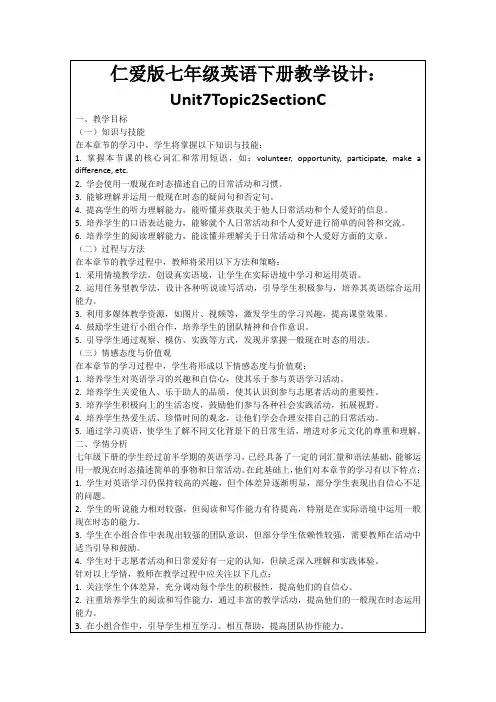
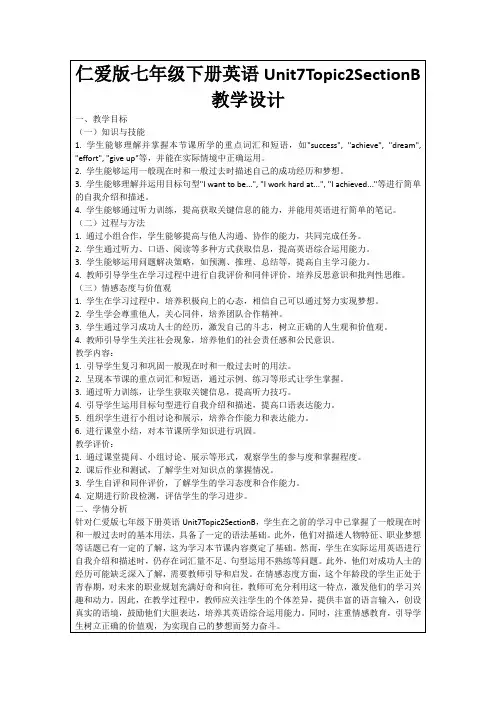
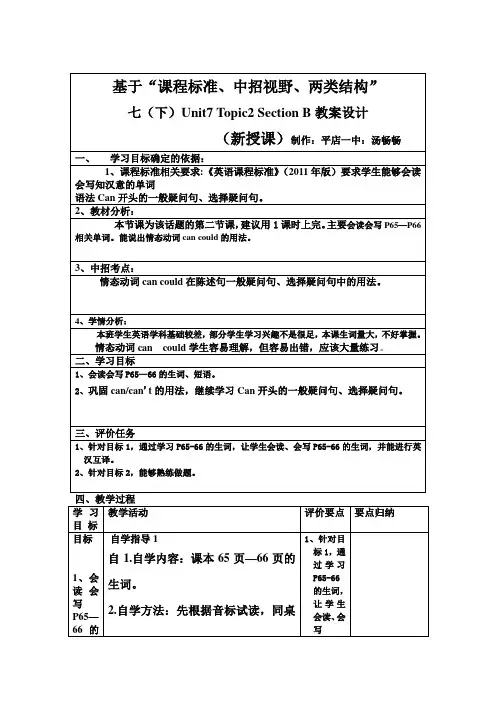
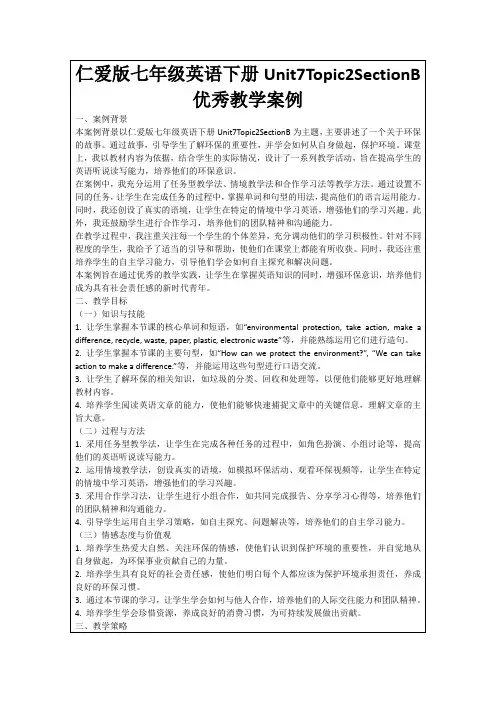

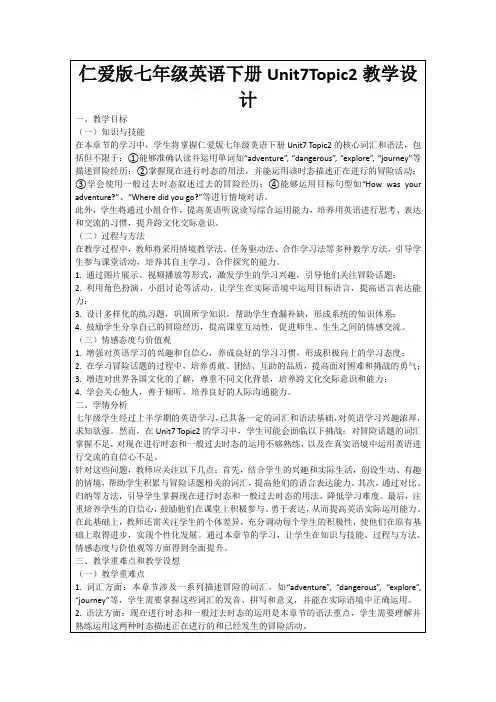
Unit 7 The Birthday PartyTopic 2 Can you sing an English song?Section A【学习目标】A、掌握情态动词can / can't 的用法。
B、掌握选择疑问句的用法:eg: Can you dance or draw? I can dance.【知识链接】Can you see the bread? Yes, I can / No, I can’t.I can dance and play the guitar.I can’t sing Chinese songs.【预习反馈】1.把下列短语译成汉语。
at Kangkang’s birthday party ____________________________________________ dance to disco _______________________________________________________ perform ballet _______________________________________________________ play the guitar / piano_________________________________________________ sing English / Chinese songs ____________________________________________ have a good time _____________________________________________________ at the party__________________________________________________________ No way! ____________________________________________________________ take photos__________________________________________________________ 2.句子1.你想唱中文歌还是英文歌?__________________________________________2.他会做什么?_______________________________________________________3.你还会做什么?_____________________________________________________4.我相信我们会在聚会上会玩的很愉快。
Unit 7 Topic 2 Can you sing an English song Section C导学案【学习目标】A:必会主要生词: agoB:熟练掌握并应用表示过去不能做couldn’t和现在能做could do事情的表达方式,如:One year ago, she couldn’t do it at all.When she was five, she could dance just a little.She can do it well now. But she couldn’t do it at all in the past.C:巩固现在进行时的表达方式:Maria is performing ballet.D:能够掌握并应用情态动词could,如:One year ago, she couldn’t do it at all.When she was fi ve, she could dance just a little.E:能够掌握句子的升降调及单词在句子中的重音。
★【学习重点】:能够用英语谈论过去不能做couldn’t和现在能做can do事情的表达方式;能用can…but…couldn’t…句型描述经历。
★【学习难点】:能够运用表示过去不能做couldn’t和现在能做can do事情的表达方式编写短文。
★【学习内容】:【自主学习】:(同学们自己先学一学吧,老师知道你们很棒!)1. 词组过关fly a kite__________ so high ______________ outd oor activities _____________one year ago _________________perform ballet_____________play ping-pong _____________ two years ago_____________2.句型过关(1)They couldn’t do it before,but now they can play ping-pong ._____________________________________________________________________(2)The children are all having a good time. _____________________________________(4)Can you count them for me? _______________________________________________【手脑并用】1.But one year ago, she couldn’t do it at all .但是在一年前,她根本不会放风筝。
【学习目标】1:正确使用选择疑问句的提问和回答以及情态动词can:2.谈论会做和不会做的事情:(1)I can only sing English songs. (2)I can’t sing Chinese songs.3.掌握字母n及字母组合oo, oi, oy, nk, ng的读音和拼写规则。
【预习达标】短语过关弹钢琴___________________ 跳迪斯科__________________ 表演芭蕾舞_______________ take photos________________ make model planes ____________ draw pictures_____________ have a good time___________ 还有什么?________________【课堂笔记】1. Oh, do you want to sing Chinese songs or English songs? 你想唱英文歌曲还是中文歌曲?选择疑问句:选择疑问句是指提供两种或以上的情况以供对方选择的疑问句,分为:一般疑问句形式:---Are you a teacher or a worker ?--- I am a worker.特殊疑问句形式:How shall we go ,____________or______________?我们是乘坐公共汽车还是飞机?基本结构:一般疑问句+or+对照选择项Do you like tea or milk?特殊疑问句+A选择项+B选择项What color do you like, red or pink?2.I can only sing English songs.can 是情态动词,表能力,没有人称和数的变化(1)陈述句:I can /can not play the piano.(2)一般疑问句:Can you sing an English song?(3)特殊疑问句:What can she do at the meeting?单项选择:1). She can sing but she _____ dance. A. can B. can’t C. doesn’t2). Maria can _______ ballet. A. to perform B performs C. perform3).---Can you dance? ---______. A. Yes, I can. B. N o, I can. C. Yes, I can’t句型转换:1). I can sing English songs.(一般问句)_______ you________ English songs?2). Lucy can ride a bike.(提问)_______ can Lucy ________?3). His uncle can draw .(否定句) His uncle _______ _________. 【学习目标】2. 能够用can/can’t表示能的有关程度,如:She can do it a little/very well.3. 能够熟练使用表达自我意愿的表达方式。
【预习达标】词组、句型过关1.take the flowers to ______________2. count sth. for sb._____________3. do… very well __________________4. 你能给我数一数吗?______________________5. 你真聪明! ______________________6. 你还会做什么?_________________【课堂笔记】1. I’d like to take these flowers to the party. 我想带这些鲜花去参加聚会。
take sb. /sth. To …意为“带某人/某物去……”My father often takes me to the zoo. 我父亲常带我去动物园。
2.I can not count so many flowers.(1) count数He ca n count from one to one hundred.(2) 如此多: so many +可数名词复数so much+不可数名词There are __________ buses on the road. There is ___________ rain this year.3、 She can do it a little /very well.(1) a little 一点儿very well 非常好表程度,修饰动词not…at all 一点也不(2) well 副词,修饰动词She can sing very well.形容词,专指身体好---How are you ? ---- I am very well.good 形容词,表事物或人的品行好Mr. Wang is a good teacher , he teaches very well.I. 用can/can’t 填空A cat ____ climb trees. But it _____ swim .A fish _____ walk , but it _____ swim very well . A pig ____ walk, but it _____ climb trees well. What _____ you do? Can you write them down?II.单选()1. I would like ______ a photo of you.A.takeB.to takeC.takingD.takes( )2. Lucy can draw a little , ______ she can not dance at all.A.andB. orC. butD.so( )3. My mother can speak English very______.A.goodB.wellC.nice( )4.There are _______flowers in the park today.A.so many B so much C.too much D.a lot( )5. ----Can you speak Chinese? -----Of course I _____ . I am a Chinese.A.can notB. doC.do notD.can( )6. ----What _____can you do ? ----I can dance.A.anotherB.otherC.elseD.also【学习目标】1. 熟练掌握并应用表示过去不能做couldn’t和现在能做can do事情的表达方式,能用can…but…couldn’t…句型描述经历。
2. 能够掌握句子的升降调及单词在句子中的重音。
【预习达标】词组、句型过关outdoor activities __________ fly a kite________one year ago _________ two years ago_________ 他们之前不会(打乒乓球),但现在他们会一点点.__________________________The children are all having a good time. _____________________________________【课堂笔记】1.But one year ago, she couldn’t do it at all .但是在一年前,她根本不会放风筝。
could是can的过去式,其否定形式为couldn’t.如:Jim______ swim when he_______eight. 吉姆八岁的时候就会游泳了。
I _______ride a bike when I ________ ten. 我十岁时不会骑自行车。
如:— _____ Alice perform ballet two years ago?—No, she _____ . But now she _____ .A. Can; can’t; couldB. Could; can; canC. Could; couldn’t; couldD. Could; couldn’t; can注意:问句中当表示请求或者询问时,could 比can 更加客气。
2. When she was five, she could dance just a little. 但是当她五岁时,她仅会跳一点舞。
when 意思为“当……的时候”,连接副词,引导时间状语从句,放在主句前面时,用逗号与主句分开;放在主句后时,不用逗号与主句分开,She could dance just a little when she was five.3. They both like playing ball games. 他们两个都喜欢球类运动。
(1) “Both”两者都作they 的同位语,放在实义动词前,be动词后面。
如,We ________ _________ students 我们两个都是学生。
They ________ __________ table tennis.他们俩都喜欢乒乓球(2)“both”两者都,强调两者;“all ”强调三者及三者以上。
如,My parents are both Chinese. 我的父母都是中国人。
My friends are all Chinese. 我的朋友都是中国人。
(3)当连接两个并列成分时,both 常与and 搭配,构成“both …….and”意思为“谁(什么)和谁(什么)都…….”He can speak _______Japanese ______ English. 他会说日语和英语。
【学习目标】1: 复习巩固谈论现在及过去能做和不能做的事情:2:复习巩固can/could及否定形式的用法以及选择疑问句及其回答:【预习达标】词组过关at the age of… _________ there is something wrong with…_________not… any more ________________ be hard for ________________with one’s help _______________ want to be…_____________【课堂笔记】1.At the age of five, she could play the piano very well. 在她五岁时,就能把钢琴弹得很好。